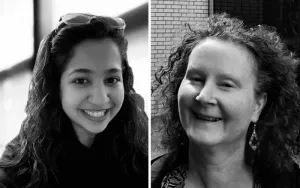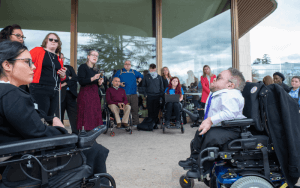
Some of the eight were previously denied compensation because they could not prove their impairments were caused by thalidomide or had no proof that their mothers had taken the drug.
They are now seeking compensation from the German pharmaceutical company Grunenthal, which manufactured thalidomide, and Diageo Scotland, which in 1997 bought Distillers, the company which distributed the drug in the UK.
One of the eight claimants is Brian Davies, from Gwynedd, Wales. Although he has a number of known symptoms of thalidomide damage, he has never received compensation.
He said: “I’m very angry at the way I, and others like me, have been treated over the years. I have never really been given any support, yet my disabilities have meant my life has been very difficult.”
He was told in the 1970s that, because his condition only affected his legs and not his arms, he would not be recognised as a thalidomide survivor.
He said: “It’s a disgrace that so many people have been denied justice in this way. In my eyes it was simply the drug companies looking to save money and ignoring the duty of care they have to people whose lives they have ruined.
“Every day I am in pain and every day is a struggle. I hope that now we finally get the justice that we have been demanding for so many years.”
Fraser Whitehead, head of group litigation at Slater and Gordon Lawyers, which is representing the eight claimants, said: “It is a tragedy that people with significant physical abnormalities caused by thalidomide have had to live with their difficulties for more than 50 years yet have never been compensated by the manufacturer and distributor.
“Grunenthal and Distillers have always claimed that the thalidomide disaster was an unavoidable tragedy and that they did everything expected of drug companies at the time. Our research has demonstrated that is nonsense.”
He added: “It is time those responsible are finally held to account for the mistakes of the past.
“Grunenthal, in particular, has done little [to] make good the immense damage that it has done and it has to accept responsibility for those affected in the UK.”
Thalidomide was used in the late 1950s and early 1960s to treat headaches, coughs and colds, but was also used by pregnant women with morning sickness.
It was finally withdrawn in 1961, but not before it was responsible for thousands of babies born with impairments, as well as – say campaigners – tens of thousands of miscarriages and stillbirths.
Despite a long-awaited apology two years ago – in which a senior executive spoke of the company’s “sincere regrets”, but shied away from accepting any blame – Grunenthal has never accepted responsibility for the harm caused by its drug, and has never paid financial compensation to the British survivors.
The legal case is the latest in a long-running global legal battle between thalidomide survivors, Grunenthal and Diageo, which in the last two years has resulted in compensation settlements in Australia (against Diageo) and Spain (against Grunenthal).
A Grunenthal spokesman said: “As we do not know any details of the claims as of today we are not in the position to provide a comment.”
A Diageo spokeswoman said: “We take any matter relating to thalidomide-injured people very seriously.
“We have a long track record of doing the right thing in our treatment of thalidomide-injured people in the UK as evidenced by our long-standing relationship with the Thalidomide Trust and the £60 million of funding we have provided to the trust to ensure the long-term care and compensation for those genuinely affected.
“At this point we have not seen any details around these allegations and so have no further comment.”
5 June 2014

 This is an existential crisis for disabled people, says campaigner after climate change court win
This is an existential crisis for disabled people, says campaigner after climate change court win Call for volunteers to fill ‘massive gap’ in support for autistic survivors of sexual violence
Call for volunteers to fill ‘massive gap’ in support for autistic survivors of sexual violence Government’s response to UN committee ‘was insult to disabled people’
Government’s response to UN committee ‘was insult to disabled people’